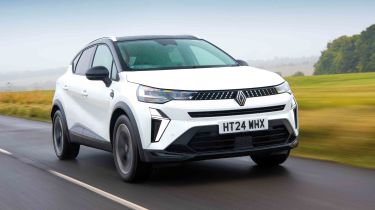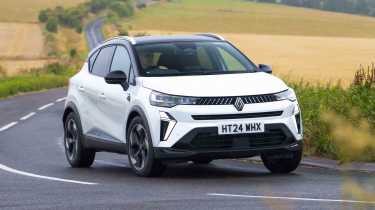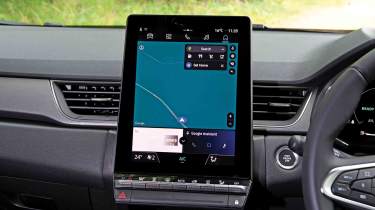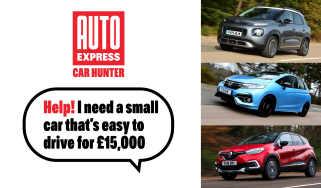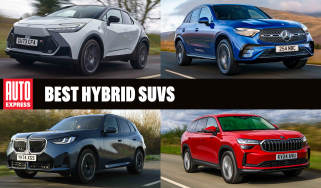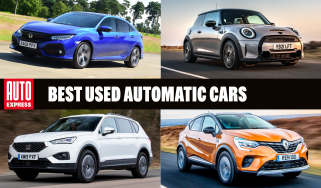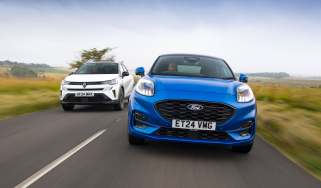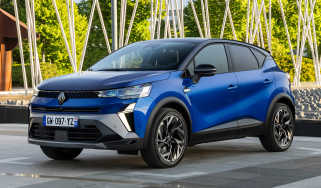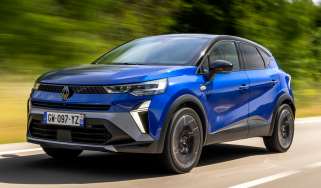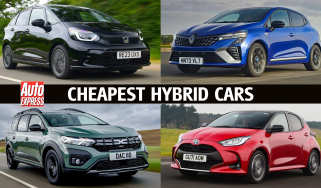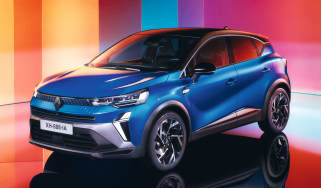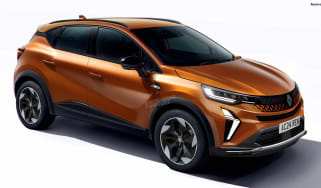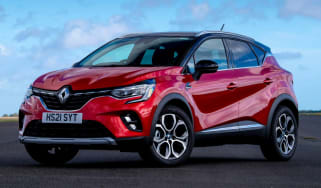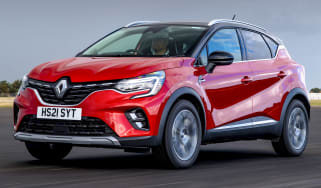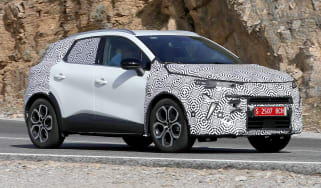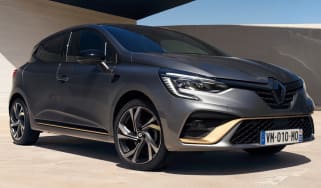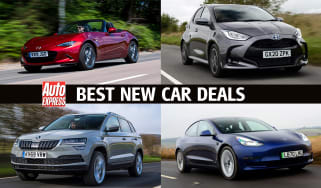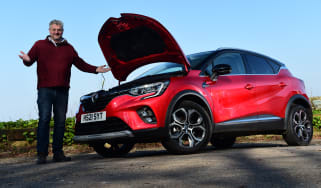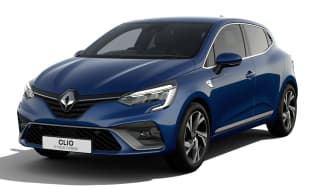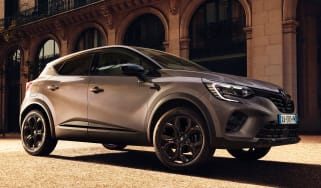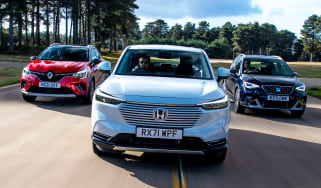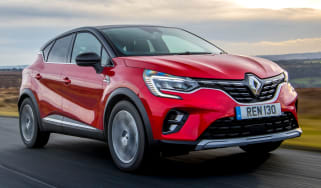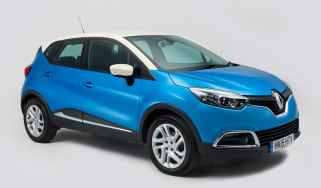Renault Captur review
Our two-time Small SUV of the Year champion gets a nip and tuck that builds on its strengths

Is the Renault Captur a good car?
Despite the Renault Captur tackling a crowded small SUV sector, it does an admirable job thanks to attractive pricing, slick tech and efficient powertrains. It might not be the newest option in the class, but valuable updates across the range have kept it competitive.
It’s not as sharp to drive as some rivals, and the cabin design is starting to look and feel a little dated, but fundamentally this car’s focus on what its buyers will appreciate is enough to keep it at the sharp end of the class. Just be careful with higher-spec models, as the value equation starts to falter as prices rise and the ride can get a bit choppy with the larger wheel sizes.
| Key specs | |
| Fuel type | Petrol, Petrol Hybrid |
| Body style | B-segment SUV |
| Powertrain | 1.0-litre three-cylinder petrol, 1.6-litre four-cylinder full-hybrid |
| Safety | 4 stars (retested 2024) |
| Warranty | 3 years, unlimited mileage |
How much does the Renault Captur cost?
With prices starting from around £21,000, the Renault Captur is the cheapest model in the company’s SUV line-up, which now spans six models. That also means it’s one of the better-value small SUVs currently for sale.
The UK range is simple, with two engine choices and three trim grades, which kick off with the Evolution variant. Highlights for the base model include 17-inch alloy wheels, a 10.4-inch infotainment screen with wireless Apple CarPlay and Android Auto, a seven-inch driver’s display, wireless charging, LED headlights and cruise control.
Used - available now

2021 Renault
Captur
46,610 milesManualPetrol1.0L
Cash £11,108
2013 Renault
Captur
25,259 milesManualPetrol0.9L
Cash £8,114
2021 Renault
Captur
44,807 milesAutomaticPetrol1.6L
Cash £13,525
2019 Renault
Captur
29,296 milesManualPetrol0.9L
Cash £10,282Renault expects most UK buyers to choose the mid-range Techno, which starts from £23,000 and adds larger 18-inch wheels, built-in Google services including Google Maps for the infotainment system, a larger 10.25-inch driver’s display, ambient lighting and a modular boot floor. The Evolution and Techno trims are available with the standard petrol and hybrid powertrain options, with the latter commanding a premium of around £3,500.
At the top of the range is the £28k Esprit Alpine , which is only available with the hybrid powertrain. It adds 19-inch alloys, adaptive cruise control, electrically adjustable and heated front seats, a heated steering wheel, and a unique interior combination of synthetic leather and fabric trim.
The Esprit Alpine also features a range of outside styling enhancements, including a dual-tone paint finish, Alpine badging, and dark grey exterior trim elements.
Engines, performance & drive
The Renault Captur is offered with a pair of powertrain choices. The first option is easy to explain: it’s a turbocharged 1.0-litre three-cylinder petrol unit that produces a rather modest 89bhp and 160Nm of torque.
However, the other option is much more advanced. The E-Tech full-hybrid model’s internal combustion element is fairly simple – a 1.6-litre four-cylinder petrol engine – but it’s paired with an intriguing hybrid system that makes a combined total of 143bhp and a healthy 250Nm of torque.
The E-Tech system consists of a pair of electric motors, with a more powerful motor capable of driving the car under electric power alone for short distances, and a smaller electric motor that’s used to start the petrol engine, work as a generator to help recharge the 1.2kWh battery, and apply a little torque to the gearbox to make gear changes smoother.
The way it works is different to the hybrid system you’ll find in the Toyota Yaris Cross, which uses a continuously variable transmission (CVT). The Toyota system is smoother overall, but it does have a habit of causing the engine revs to soar when accelerating up to motorway speeds. The Renault system can also be a little raucous when accelerating hard, but it quietens down once up to speed, and isn’t as prone to engine rev flares when overtaking slower-moving traffic as the Yaris Cross. All in all, the E-Tech is much more efficient than a regular petrol automatic small SUV, and it compares favourably with its fellow hybrid rivals for running costs.
| Model | Power | 0-62mph | Top speed |
| Renault Captur TCe 90 | 89bhp | 14.3s | 104mph |
| Renault Captur E-Tech 145 | 143bhp | 10.6s | 106mph |
What is the Renault Captur like to drive?
Comfort is the Captur’s calling card, with the French model delivering a smoother ride than most alternatives in this class. We think that the entry-level 89bhp petrol engine could do with a little more power, though.
In town
When paired with the hybrid powertrain, the Captur always moves off in electric mode, so it’s very smooth and quiet when shuffling about in traffic.
The base petrol model is hampered by a spongy clutch pedal, which makes the same low-speed journeys less pleasant. It’s one of our few criticisms, though, because otherwise, the Captur’s decent visibility, light steering and soft ride make it a really pleasing place to be during the slowest, most boring parts of the majority of trips in urban areas.
On A- and B-roads
The soft suspension of the Renault Captur can take more than one bounce to settle if you hit a larger bump, but it generally delivers impressive comfort on the move. You’ll also notice a reasonable amount of body lean in the bends – a feeling that is enhanced by what seems like an SUV-like high centre of gravity – compared with the more agile Ford Puma, but you can still confidently maintain a very satisfying flow along a twisty road in the Captur because there’s plenty of outright grip on offer.
While the hybrid powertrain switches between petrol and electric near-seamlessly around town, if you demand a sudden burst of acceleration at speed, the engine can take a while to wake up, at which point the four-cylinder unit makes a lot of noisy fuss.
On the motorway
At higher speed, the Captur Hybrid easily has what it takes to keep up with traffic. The base petrol model feels much more strained, though, and you really need to use the full travel of that accelerator pedal to make decent progress. Once up to speed, both are impressively comfortable and refined, but we’d like slightly more precise steering to give an added feeling of stability.
Engines, 0-62 acceleration and top speed
High performance is rarely a top priority in this class, but the entry-level 1.0-litre TCe powertrain in the Renault Captur is, without sugar-coating it, slow. With the engine packing a peak power output of only 89bhp, and a lean 160Nm of torque, acceleration is leisurely beyond the sluggish on-paper 0-62mph time of 14.0 seconds. Being a little undernourished, the engine needs to work quite hard to keep up with traffic at high speeds, affecting refinement and economy. The six-speed manual gearbox shifts well, which is good news because you’ll need to use it frequently to make good progress.
The Captur E-Tech largely fixes all these issues, but for a not inconsiderable £3,500 extra. On paper, the hybrid’s 143bhp doesn’t seem much more rapid, but the clever system of electric motors and a four-cylinder petrol engine combine to create a more potent powertrain overall.
The E-Tech hybrid uses a system you’ll find in many Renault cars, and the Nissan Juke, where the petrol engine is aided by a small electric motor – helping it feel torquier and more responsive than its 10.6-second 0-62mph time suggests.
At low speeds, the Captur’s hybrid system largely relies on one or both of its e-motors, keeping the petrol engine dormant up to 80 per cent of the time. This helps reduce fuel consumption by up to 40 per cent on the WLTP urban economy cycle. It’s not a plug-in hybrid, so there’s no need to charge up separately, instead it’s the petrol engine that chimes in when more power is needed, charging the battery simultaneously.
When the engine wakes up, it’s able to drive the front wheels with or without the electric motor, and does so through a four-speed automatic transmission. At high speeds, the petrol engine can sometimes become a little raucous if you ask for full power, as it squeezes all the available power from the four-cylinder engine.
MPG, emissions & running costs
Whichever powertrain you choose, the Renault Captur is unlikely to break the bank. The range starts from just over £21,000, which places it among the cheapest cars in the segment, while certain PCP finance deals can be paired with zero per cent APR to minimise the monthly payments.
Officially, the petrol model achieves up to 47.9mpg on the combined WTLP cycle, but fuel efficiency is what the hybrid model does best. Renault says it’ll return 60.1mpg; while we didn’t quite match that figure when we ran a Captur on our fleet, we achieved 53.2mpg over the course of six months and 9,000 miles of driving, with plenty of those journeys covered on motorways.
When you’re in town, the Captur’s ability to cover around 80 per cent of its mileage in full-electric mode means that the official figure should come within close reach.
| Model | MPG | CO2 | Insurance group |
| Renault Captur TCe 90 | 47.9mpg | 134g/km | 11E |
| Renault Captur E-Tech 145 | 60.1mpg | 105g/km | 16E |
Tax
From the second year onwards, the hybrid Captur costs £180 annually in VED charges. While fully electric vehicles are significantly cheaper for company-car users to run, the Captur E-Tech’s low CO2 emissions of 105g/km help it to undercut many other petrol and hybrid cars in its class.
Insurance
Depending on powertrain and trim, the Captur’s insurance groups range from 11 to 16, with the lowest E-Tech hybrid model starting at group 14.
Depreciation
The second-generation Renault Captur is a respectable performer in terms of residual values. Data from our experts suggests that it will retain between 52 and 55 per cent of its original list price over three years and 36,000 miles, depending on the chosen powertrain and trim. The 1.0 TCe 90 Evolution model is the best performer, and should retain around 55 per cent.
To get an accurate valuation for a specific model, check out our free car valuation tool...
Interior, design & technology
The Renault Captur has undergone a substantial facelift, applying Renault’s new design language to the existing model with varying levels of success. The biggest difference is found up front, where the complex and curvy headlights have been replaced with more angular LED headlights that create a more distinct brow.
This is matched with a graduated grille pattern and the new Renault logo that together do a good job of keeping the overall design looking sharp. These big changes are not reflected along the sides or at the rear, which are a little softer and less chiselled.
Renault offers two general styling themes: the base car features lots of body-coloured elements for a cleaner look and either 17- or 18-inch wheels, while the top-of-the-range Esprit Alpine uses the Alpine brand’s sportier styling elements that include grey accents up front, a dual-tone roof with contrasting silver roof rails, and wheels that are upsized to 19-inches.
Renault has included generous levels of standard kit: all cars come with alloy wheels, LED headlights, auto folding electrically adjustable mirrors, rear privacy glass, automatic air conditioning and a host of active safety systems such as Lane Keep Assist and Traffic Sign Recognition.
What is the Renault Captur like inside?
The dashboard has been gently revised for the facelifted model, and the old car’s large rotary dials for the climate control dropped. However, the good news is that unlike, some rivals, actual buttons remain, although the bank of rocker switches are a bit more fiddly to use than the old layout.
The flip side of this is that an additional storage shelf has been freed up just beneath the main touchscreen. A floating centre console brings both the stubby gear selector and smartphone shelf with its USB ports (and wireless charging on range-topping trims) close to the front seats.
What is the interior quality like?
Supermini-based SUVs commonly feature lots of hard, scratchy plastics in order to reduce costs, and while the Captur is no different, most of the cheap-feeling materials tend to be low down on the door trims and centre console.
The elements used higher up have an air of quality that’s above average for the class, while fabric-trimmed panels and coloured plastics on the dashboard help to break up what would otherwise be a fairly grey and monotonous cabin. Other details, such as the razor-sharp resolution of the digital driver’s display, help add to the Renault’s overall feel-good factor.
Sat-nav, stereo and infotainment
Unlike the previous Captur, all trim levels now come equipped with the full-size 10.4-inch touchscreen infotainment system. A rear-view camera and cruise control are also fitted as standard, while the top-spec Esprit Alpine cars add adaptive cruise control, an electrically adjustable driver’s seat plus heating for the front seats and steering wheel.
Renault’s OpenR Link infotainment system that’s used in the Captur features an Android operating system, which was first introduced in the Megane E-Tech. Choose Techno trim or above and it includes built-in Google Maps, which looks fantastic on the screen, responds to inputs and loads menus very quickly, and is easy to use. It’s so good that there’s little reason to connect your phone to use a navigation app to find your way around and avoid traffic jams.
A shortcut bar is integrated into the top of the display, so it’s always easy to navigate the intuitive system.
Boot space, comfort & practicality
The second-generation Captur sits on the same CMF-B platform as the latest Renault Clio and it’s 110mm longer, 19mm wider and 17mm taller than the original model. The new platform and bigger dimensions have brought gains in passenger space and practicality, helping the Captur attract customers with growing families. Usefully, each door can take a 1.5-litre water bottle, and there’s good storage for cups and phones – including a wireless charging plate.
Access for passengers at the rear is good, and noticeably better than the Peugeot 2008, which has a lower roofline. The rear seats in the Captur are also more comfortable than those in the Ford Puma where you have to sit higher up with your legs tucked back.
| Dimensions | |
|---|---|
| Length | 4,239mm |
| Width | 1,797mm (2,004mm inc mirrors) |
| Height | 1,575mm |
| Number of seats | 5 |
| Boot space | 422-1,276mm (petrol), 326-1,276mm (E-Tech hybrid) |
Dimensions & size
The overall length of the Captur has increased to 4,239mm, with a width of 1,797mm (excluding mirrors) and a height of 1,575mm. In comparison, the Ford Puma is 20mm shorter, 8mm wider and stands 1,537mm tall, while the Peugeot 2008 is 4,300mm long, 1,770mm wide and 1,550mm in height.
How practical is the Renault Captur?
Seats & space in the front
There’s plenty of adjustment in both the driver’s seat and steering wheel, giving lots of scope for getting comfortable in what is quite a lofty seating position for a small SUV. However, storage is a bit of a mixed bag, with the raised centre console opening up space for a large storage area below, including a pair of cup-holders. However, the glovebox capacity is impacted by the fuse box, and the door bins are fairly slim.
Seats & space in the back
Interior space is excellent for passengers, with lots of headroom backed up by above average kneeroom for the segment. There’s more space to stretch your legs out here than in a Jeep Avenger or a Nissan Juke, if not quite as much as in a Skoda Kamiq or a Dacia Duster. Foot room is also excellent under the front seats.
Unusually in this class, the Captur comes with a sliding rear bench. It offers benefits for boot space, but with it moved all the way forward, it all but completely eliminates rear kneeroom. ISOFIX points are hidden behind zips, which makes them a bit fiddly to access.
Boot space
The 422-litre luggage area is reasonably sized, if not class-leading, but the sliding rear seat bench sets it apart from rivals. Move it all the way forward, and the total volume grows to a huge 536 litres, but that renders the back seats pretty much useless for anyone but very young children.
That boot space benefits from plenty of under-floor storage, but it’s a slightly uneven shape. The load lip is also quite high, which makes lifting heavier items on board a bit more difficult than in some rivals.
Towing
Both the TCe 90 has a maximum braked towing weight of 1,200kg, while the hybrid has a reduced rating of 750kg.
Reliability & safety
Renault bagged a disappointing 28th place out of 32 manufacturers in the 2024 Auto Express Driver Power satisfaction survey. Owners appreciate the brand’s low running costs but aren’t fans of its powertrain smoothness and performance.
Euro NCAP was much more appreciative of the Captur, however, awarding it a maximum five-star safety rating when the French model was tested in 2019. However, it has been re-assessed in 2024 alongside the Renault Symbioz, which shares parts in common with the Captur. The test has become tougher since the Captur was first tested in 2019, and due to it not including such features as a child presence detection system, a warning to prevent you from opening the doors into the path of approaching vehicles (such as cyclists), a central airbag to stop the front seat occupants from hitting each other in a side collision, and having poor chest protection for the driver in the front impact, its previous five-star score has been adjusted to four stars. That’s still better than the three-star result of the Dacia Duster, but behind the highest five-star rating of the admittedly pricier Toyota C-HR.
There’s still a raft of driver assistance systems as standard on the Captur, from a tyre pressure warning light, an Active Emergency Braking System, Traffic Sign Recognition, cruise control with a speed limiter, Hill Start Assist, a distance warning alert, automatic headlights and windscreen wipers, Lane Departure Warning, Lane Keep Assist and E-Call: a system that allows the emergency services to be called automatically or manually in the event of an collision.
| Key standard safety features | Euro NCAP safety ratings |
|
|
Warranty
Every Renault Captur is covered by a three-year/60,000-mile warranty. The mileage allowance is actually unlimited during the first 24 months, then drops to a total of 60,000 miles or 3 years, whichever comes first.
Servicing
Renault’s EasyLife servicing plan allows customers to spread the cost of scheduled maintenance over monthly instalments. There's the option of a three-year/30,000 mile plan, or a four-year/60,000 mile package.
Renault Captur alternatives
Renault is one of a number of manufacturers battling for sales in the small SUV class. There’s the premium and tech-laden Peugeot 2008, the fun-handling Ford Puma, and three VW Group rivals in the shape of the Skoda Kamiq, SEAT Arona and VW T-Cross. There’s also the leftfield Fiat 600 and the closely related Jeep Avenger, along with a range of Japanese alternatives, including the Nissan Juke (which shares the same platform with the Captur), Toyota Yaris Cross, Honda HR-V, not forgetting tech-forward Hyundai Kona and Kia Niro options from South Korea.
Used and nearly new
The Mk1 Renault Captur has been around since 2013, but the current model takes its basis from the Mk2 launched in 2020. There’s plenty of choice for buyers seeking a used example with a particular engine/trim combination. You'll notice the cheaper feeling interior and dated tech in early cars, but if you're looking for a good-looking compact crossover that offers decent space and is easy to drive, the Captur should be of interest.
Renault Captur history
Renault Captur Mk1: 2013-2019
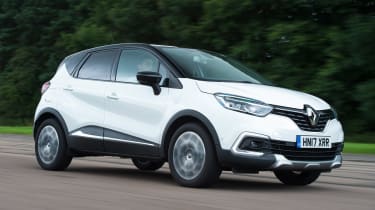
As one of the first entrants in the small SUV segment back in 2013, the Renault Captur was quick to find an audience looking for a supermini footprint combined with the added practicality and versatility of an SUV. Today, all of Renault’s key rivals have an offering of this size, creating a marketplace full of competitive rivals.
The small SUV class is aimed at the growing family looking for style, space and plenty of safety kit. Renault has ticked all three boxes, but particularly the latter, as all models feature a host of equipment designed to protect the driver, passengers and pedestrians out on the road.
The 2024 facelift of the Mk2 Captur, that originally launched in 2019, introduced a new look, featuring a wider grille and LED lights at the front and rear, helping it to cut a more impressive figure on the road. Customers that wish to really stand out from the crowd are well catered for, too, with a choice of six exterior body colours with or without a contrasting black roof.
Frequently Asked Questions
The Captur has a fairly standard three-year/60,000-mile warranty, which is slightly shorter than the 3yr/100,000-mile cover for Renault’s EVs. The mileage limit for the Captur is unlimited in the first two years, though.
